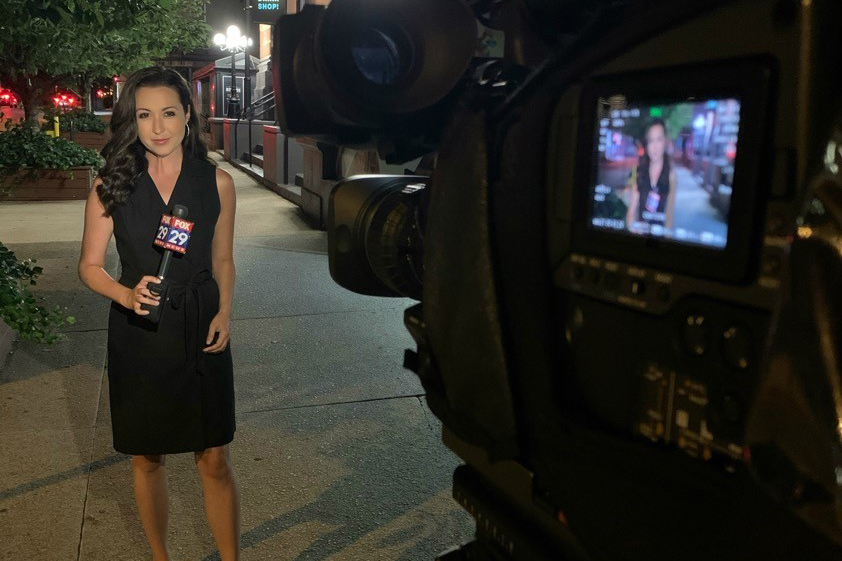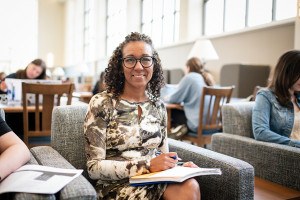FOX 29’s Lauren Dugan on How to Have Constructive Conversations About Controversial Topics—Even on Social Media

Faced with a fractured media landscape and a charged political environment like never before, it might seem like local news would be drowned out. But even in this era of “alternative facts” and a president who won’t concede, Lauren Dugan, Fox29’s new on-air Philly reporter, has been successful in reaching the hearts and minds of a diverse audience that doesn’t always see eye-to-eye. We spoke with Dugan about her first year as a reporter in Philly, and how she manages to connect her viewers and readers with the truth on TV and social media at a time when just reporting the facts has become increasingly complex.
The pandemic is, unfortunately, highly politicized at this point. How has that affected covering the news, when so many of the facts are going to be challenged?
Speaking to the divisive political climate we’re in, it’s tough to be a journalist right now. Being from this area helps. I grew up here. I know the history. I went to Villanova for my bachelor’s degree and for my master’s degree in Communication. My parents live in Flemington, New Jersey, right outside of Bucks County.
While it’s such a divisive time, I think that it’s our stories that connect us. That’s something that you share in common with the people around you. Local news stories communicate who we are as Philadelphians, what’s going on in our neighborhood, what we value, what are our obstacles and our issues.
It’s up to journalists to question what’s going on, why certain decisions are made, talk to all the people involved and figure out the consequences of each decision. Everyday life is changing. So that’s where I think local news comes in and why it’s so important.
You’re saying with larger, national stories, people can get their facts from social media or alternative sources, but when it’s closer to their lives, like with local news, there’s less room for doubt?
It’s a journalist’s job to collect all the voices. I’m not going to tell you what to believe, but I’m going to present people’s stories and document what’s happened to them. And then the call is up to you. That’s why people, especially in this day and age, they have to be smart news consumers as well.
What role does local news play in a world where more and more people are getting their news from social media?
There’s a lot of noise on social media. But journalism still has a place in this digital climate because it’s up to journalists to provide people with the context of the situation. What does that story mean for this area? Social media has a very important role in the speed of information. By the 10 p.m. news, you probably already know the headlines of the day thanks to social media. Journalism is still all about providing the context and communicating what those headlines mean for your neighborhood.
How do you respond to negative reactions on social?
First, I don’t respond to the nasty stuff. Other times, when I tweet something out, and get a couple of negative responses, I try to always link to an article for more information. I encourage people to dig deeper. I’ll say, ‘Hey, here’s the link to the full story.’ We only have so much space on social media to say something, so it’s important to link to more.
Do you find it difficult to produce under the new, tighter digital deadlines?
When you’re a working journalist under deadline, it can be difficult to reflect on all of the different perspectives or scenarios that might be at work. That’s one of the reasons why I wanted to go back and get my master’s degree at Villanova. I wanted to learn to work through those ethical dilemmas I will be faced with while under the pressure of a deadline.
How can people become better news consumers?
Right now, I’m teaching broadcast journalism at a local college on Thursday nights. I tell my students, I want this to be a media criticism class. They’re not shy about coming out with something they heard and disagree with. We talk through it because I think it’s important to hear viewers’ and other people’s concerns.
We had our ethics class the other day, and we had that conversation: Do you trust the news? What news organizations do you follow? Who do you trust when big news breaks? To be a better news consumer, you should watch multiple news organizations. You should read the full story on the organization’s website. You should reach out to the journalist with an open mind.
How do you handle sources that might be unfriendly toward or distrustful of journalists?
One of the reasons why I wanted to come back to this area is because I think there’s an established relationship and respect for the local media. When you’re talking with a source that lives in this area, saying, ‘Hey, I’m from this area too. I care about it.’ Immediately there is a wall that’s knocked down.
For any aspiring journalists out there, how did you get your start in journalism?
One of the reasons I went to Villanova was because they have a Vatican internship program where they send students to go to those offices every semester. But in 2014, when I was slated to go to the Vatican as a news intern, that summer, my now-boss, Jim Driscoll, offered me a position as a reporter in Fox 29’s junior reporter program.
So, my on-air debut was reporting from the Vatican and Saint Peter’s Square when I was 20 years old. It was, honestly, the hardest thing I ever had to do. I had a tripod and a small camera, and I had no connections or sources over there. I don’t speak Italian, and I was trying to tell these stories and make connections. But I had great people supporting me, my professors at Villanova and the whole Fox 29 team.
Later on in my career, I was reporting in Charlotte and doing my master’s degree at Villanova, so I would fly back several times a semester for the in-person session, and my professors were always so understanding and helpful in letting me pursue that opportunity and continue my education. I have to give credit to my graduate professors for their support.
Learn more about Villanova’s graduate programs in Communication.
This is a paid partnership between Villanova University College of Liberal Arts and Sciences and Philadelphia Magazine

